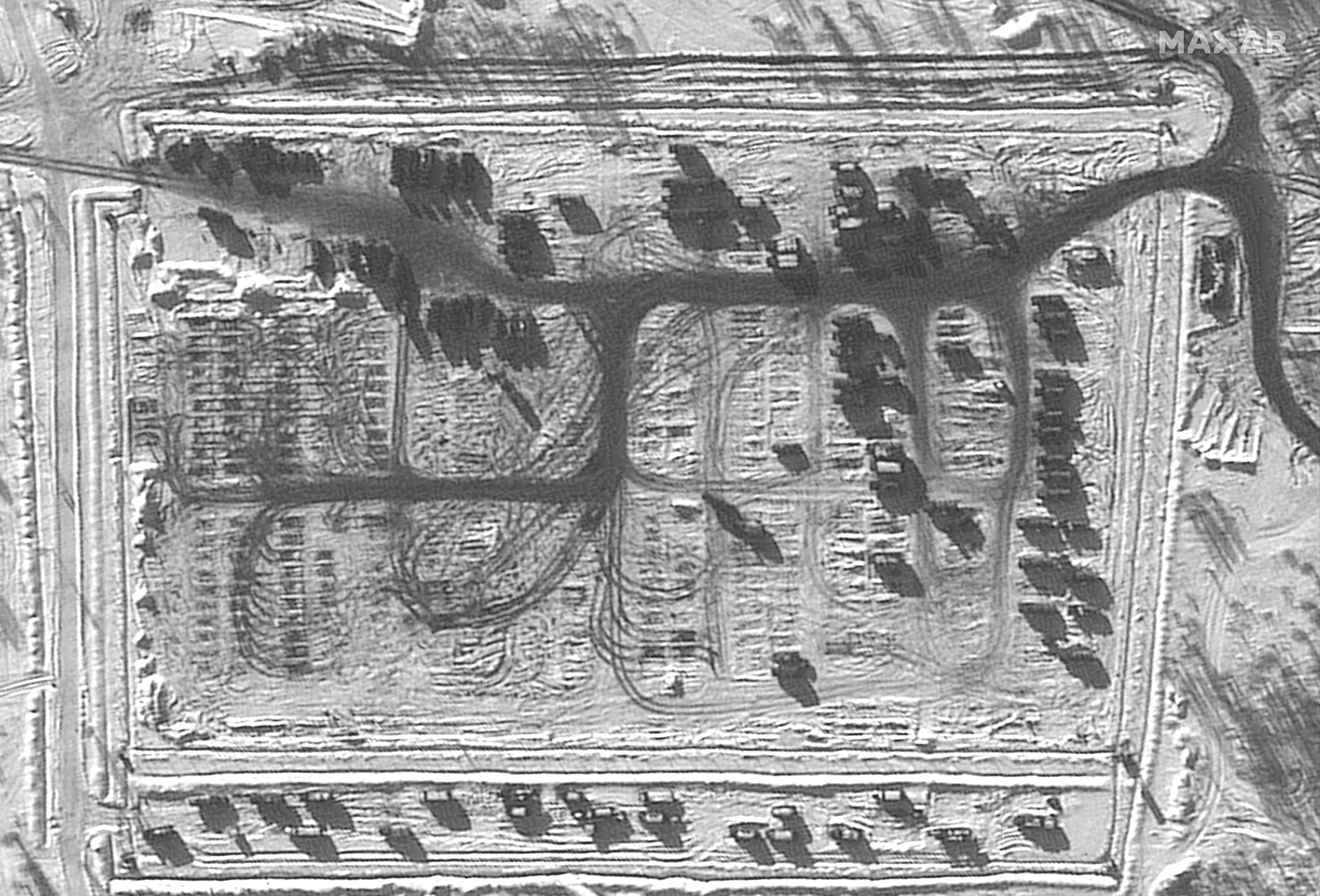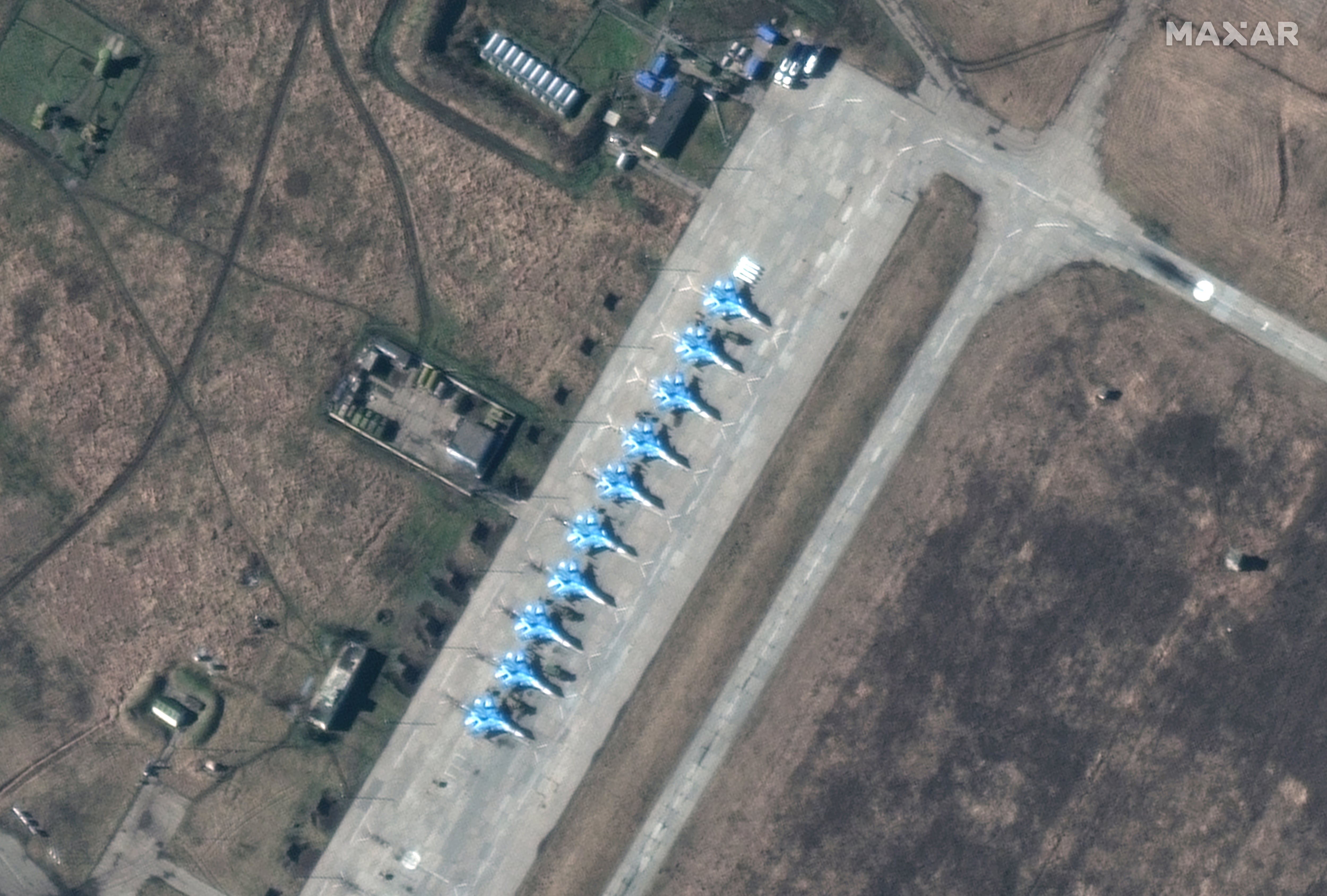Russia said Tuesday that some units participating in military exercises would begin returning to their bases, adding to glimmers of hope that the Kremlin may not be planning to invade Ukraine imminently, though it gave no details on the pullback.
The announcement came a day after Russia’s foreign minister indicated the country was ready to keep talking about the security grievances that led to the Ukraine crisis — changing the tenor after weeks of rising tensions. Still, Western officials continued to warn that an invasion could come at any moment and said some forces and military hardware were moving toward the border, muddying the picture.
It wasn’t immediately clear where exactly the troops that the Russian Defense Ministry said were pulling back were deployed or how many were leaving, making it hard to understand the significance. The announcement pushed world markets and the ruble up, but Ukraine’s leaders expressed skepticism.
“Russia constantly makes various statements,” Ukrainian Foreign Minister Dmytro Kuleba said. “That’s why we have the rule: We won’t believe when we hear, we’ll believe when we see. When we see troops pulling out, we’ll believe in de-escalation.”
A U.S. defense official said the Pentagon is reviewing the Russian claims.
“We are aware of reports of Russian claims that they are withdrawing some forces away from the border with Ukraine,” the defense official told Military Times. “Our analysts are reviewing, but we have nothing further at this time.”
Russia has massed more than 130,000 troops near Ukraine, sparking the fears of an invasion. Russia denies it has any plans to invade Ukraine, despite placing troops on Ukraine’s borders to the north, south and east and launching massive military drills nearby.
The new glimmers of hope accompanied a flurry of diplomacy. German Chancellor Olaf Scholz planned to meet with Russian President Vladimir Putin in Moscow, a day after he sat down with Ukraine’s leader in Kyiv. Foreign Minister Zbigniew Rau of Poland, one of Russia’s most strident European critics, was also in Moscow on Tuesday to meet Lavrov, while Ukraine’s foreign minister hosted his Italian counterpart.
Foreign Minister Sergey Lavrov’s comments came at a made-for-TV meeting with Putin and seemed designed to send a message to the world about the Russian leader’s position. The foreign minister argued that Moscow should hold more talks, despite the West’s refusal to consider Russia’s main demands.
The talks “can’t go on indefinitely, but I would suggest to continue and expand them at this stage,” Lavrov said, noting that Washington has offered to discuss limits for missile deployments in Europe, restrictions on military drills and other confidence-building measures.
Moscow wants guarantees that NATO will not allow Ukraine and other former Soviet countries to join as members. It also wants the alliance to halt weapons deployments to Ukraine and roll back its forces from Eastern Europe.
Lavrov said possibilities for talks “are far from being exhausted.”
Putin noted that the West could try to draw Russia into “endless talks” and questioned whether there is still a chance to reach agreement. Lavrov replied that his ministry would not allow the U.S. and its allies to stonewall Russia’s main requests.
RELATED

The U.S. reacted coolly.
“The path for diplomacy remains available if Russia chooses to engage constructively,” White House principal deputy press secretary Karine Jean-Pierre said. “However, we are clear-eyed about the prospects of that, given the steps Russia is taking on the ground in plain sight.”
One possible off-ramp emerged this week: Ukraine’s ambassador to the U.K., Vadym Prystaiko, pointed at a possibility of Ukraine shelving its NATO bid — an objective that is written into its constitution — if it would avert war with Russia.
Prystaiko later appeared to back away from the idea, but the fact that it was raised at all suggests it is being discussed behind closed doors.
Even amid the hopeful signs, the U.S. and European countries kept up their warnings.
British Foreign Secretary Liz Truss reiterated Tuesday that the danger of an invasion still exists, telling Sky News that it “could be imminent.” But she added that “there is still time for Vladimir Putin to step away from the brink.”
Norwegian Foreign Minister Anniken Huitfeldt issued a similar warning.
U.S. officials have said the Russian military continued apparent attack preparations along Ukraine’s borders. A U.S. defense official said small numbers of Russian ground units have been moving out of larger assembly areas for several days, taking up positions closer to the Ukrainian border at what would be departure points if Putin launched an invasion.
The official spoke on condition of anonymity to discuss information not publicly released. CBS News was first to report on the movement of the units.
RELATED

Maxar Technologies, a commercial satellite imagery company that has been monitoring the Russian buildup, reported increased Russian military activity in Belarus, Crimea and western Russia, including the arrival of helicopters, ground-attack aircraft and fighter-bomber jets at forward locations. The photos taken over a 48-hour period also show ground forces leaving their garrisons and combat units moving into convoy formation.
Still, Ukrainian security and defense council chief Oleksiy Danilov downplayed the threat of invasion but warned of the risk of “internal destabilization” by unspecified forces.
“Today we do not see that a large-scale offensive by the Russian Federation can take place either on (Feb.) 16th or the 17th,” he told reporters. “We are aware of the risks that exist in the territory of our country. But the situation is absolutely under control.”

As if to show defiance, Ukrainian President Volodymyr Zelenskyy said Wednesday would be a “day of national unity,” calling on the country to display the blue-and-yellow flag and sing the national anthem in the face of “hybrid threats.”
“It is not the first threat the strong Ukrainian people have faced,” Zelenskyy said Monday evening in a video address to the nation. “We’re calm. We’re strong. We’re together.”
If Russia does de-escalate, international pressure will have played a key role, a former senior Ukrainian military official told Military Times.
“Ukraine has our own intelligence capability,” Andrii Ryzhenko, former deputy chief of staff of the Ukraine navy. told Military Times Monday afternoon. “It’s not so sophisticated like the US, but the U.S. and U.K. are also providing that capability.”
While Ukraine doesn’t see any signs of an immediate attack on the 16th or 17th, the U.S. is putting “psychological pressure on Russia,” Ryzhenko told Military Times. “If you say that Russia, ‘I know you’re gonna attack Ukraine, on the 16th or 17th, regardless if it’s true or not, they will not do it on this date. It’s psychology.”
The country is preparing nonetheless. Kyiv residents received letters from the mayor urging them “to defend your city,” and signs appeared in apartment buildings indicating the nearest bomb shelter. The capital has about 4,500 such sites, including underground parking garages, subway stations and basements, the mayor said.
Dr. Tamara Ugrich said she stocked up on grains and canned food and prepared an emergency suitcase.
“I don’t believe in war, but on TV the tension is growing every day, and it’s getting harder and harder to keep calm,” she said. “The more we are told not to panic, the more nervous people become.”
Meanwhile, Russian lawmakers called on Putin on Tuesday to recognize rebel-held areas in eastern Ukraine as independent states. The State Duma, Russia’s lower house of parliament, voted to submit an appeal to Putin to that effect.
Kremlin spokesman Dmitry Peskov said the issue of recognizing the self-proclaimed republics is “very, very relevant to the public.” But it was unclear how he would respond or how this could influence Russia’s actions in Ukraine.
While the U.S. warns that Russia could invade Ukraine any day, and Kyiv is alerting residents to locate their nearest bomb shelters, the drumbeat of war is all but unheard in Russia itself.
The Kremlin has cast the U.S. warnings of an imminent attack as “hysteria” and “absurdity,” and many Russians believe that Washington is deliberately stoking panic and fomenting tensions to trigger a conflict for domestic reasons.
Few expect a war.
In Russia’s Belgorod region about 18 miles from Ukraine’s border, residents carry on with life as usual, even as more military personnel have been passing through village streets.
“Planes, helicopters just started flying, I guess, to patrol the border,” said Vladimir Konovalenko.
Villager Lyudmila Nechvolod says she’s not worried.
“We are friends with Ukraine. And we are not sure that Ukraine wants war with us. ... We are really on the border, we really have relatives here and there, everyone has somebody there (on the Ukrainian side),” she said. “No one wants war.”
Karmanau reported from Kyiv, Ukraine. Associated Press writers Angela Charlton and Sylvie Corbet in Paris, Geir Moulson in Berlin, Jill Lawless in London, Edith M. Lederer at the United Nations, Jan M. Olsen in Copenhagen, Denmark, and Robert Burns in Washington and Military Times senior managing editor Howard Altman contributed to this report.





